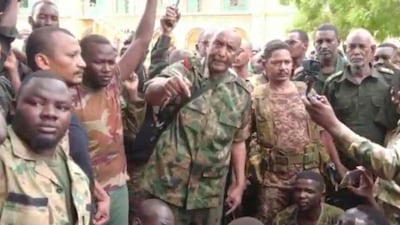The head of Sudan's army has declared a ceasefire for Eid Al Adha, at the same time urging young men to join the fight against the paramilitary Rapid Support Forces.
Gen Al Burhan made the announcement on Tuesday night, a day after the RSF declared that it would observe a two-day truce for Eid on Tuesday and Wednesday. Its men, it said, would fight only in self defence.
Both the army and the RSF said their truces are unilateral.
Numerous ceasefires have been declared and ignored since fighting between the army and the RSF broke out on April 15. Several of these were brokered by Saudi Arabia and the US at talks in Jeddah. Those talks were suspended last week, with the mediators reportedly looking for a new formula for negotiations.
"We ask all of the country's youth and all those who can defend not to hesitate or delay in playing this national role in their place of residence or by joining the armed forces," Gen Al Burhan said on Tuesday.
The war has led to widespread destruction and looting in Khartoum, while also fuelling unrest in other parts of Sudan, particularly in the western Darfur region, where attacks and ethnic violence have spread, leaving hundreds dead and forcing tens of thousands to flee to Chad.
As the RSF fights to seize the capital, millions of people continue to shelter in the sprawling city despite being caught in the crossfire without electricity and water in oppressive heat. They also face a near total lack of health care.
The US, Norway and Britain, a group known as the Troika, on Tuesday condemned "widespread human rights violations, conflict-related sexual violence, and targeted ethnic violence in Darfur, mostly attributed to fighters of the Rapid Support Forces and allied militias".
The RSF evolved from the Janjaweed and associated militias that fought on the side of the government of ousted president Omar Al Bashir in a rebel uprising in Darfur in the 2000s. The group has been accused of war crimes for its role in the violence.
Al Bashir himself has been indicted by the International Criminal Court for crimes against humanity, genocide and war crimes in Darfur.
In the current fighting, the RSF has been accused of looting humanitarian aid supplies, factories and houses.
Moganaby Al Tayeb, a physician who lives in Khartoum's Taif district, told The National on Wednesday that RSF fighters had stolen his family's two cars and his home's air conditioning units.
"They brought along a car mechanic to ensure that the cars can run. When he was done, they stole his mobile phone and threatened to kill him if he repeats the story of what happened," he said.
"Many in our neighbourhood have sent women and girls to stay with relatives in areas outside Khartoum because they fear for their safety.
"They had to because the fighters often ask to see the females of the household."
RSF chief Gen Mohamed Dagalo responded to the accusations on Tuesday in an audio recording posted online.
The RSF will take "swift and strict action" against those in its ranks who have carried out such abuses, he said.

The group said on Monday that trials would begin for its undisciplined members . Mirroring the practices of governments in Muslim majority nations, he announced the release of "100 prisoners of war" from the army to mark the Eid Al Adha holiday.
Since the beginning of the conflict, both sides have regularly announced prisoner swaps through the Red Cross, without ever reporting the exact number of those captured.
The recording, however, appeared to be mostly a damage-limitation exercise after the RSF came under strong international criticism for its actions in Khartoum and Darfur, where it killed hundreds of unarmed civilians from an ethnic African tribe, Masalit, in the town of Al Geneina near the Chad border.
The UN and African Union have warned of an "ethnic dimension" to the conflict in Darfur.
On Tuesday, Raouf Mazou, the UN refugee agency's assistant high commissioner for operations, said in Geneva that there was a "worsening situation" in West Darfur state.
"According to reports from colleagues on the ground, the conflict has reached alarming levels, making it virtually impossible to deliver life-saving aid to the affected populations," he said.
Night-time curfew
Elsewhere in the country, new fronts have opened against the army from a rebel group in South Kordofan state, south-west of the capital, as well as in Blue Nile state on the border with Ethiopia.
In South Kordofan, authorities have declared a night-time curfew to curb the violence.
The Troika expressed "deep concern" about the fighting in Blue Nile, South Kordofan and Darfur, saying the violence "risked further broadening the conflict".
Hundreds of civilians have fled over the border to Ethiopia because of fighting reported near Kurmuk in Blue Nile, the UN said.
About 645,000 have so far fled to neighbouring countries, mostly Egypt and Chad, according to the latest International Organisation for Migration data.
The conflict has displaced about 2.2 million within Sudan, the agency said.
Aid has reached at least 2.8 million in Sudan, the UN said, but agencies report major hurdles to their work, from visas for foreign humanitarian workers to securing safe corridors and a lack of funds.
A record 25 million, more than half the population, in Sudan need humanitarian aid and protection, the UN said.

